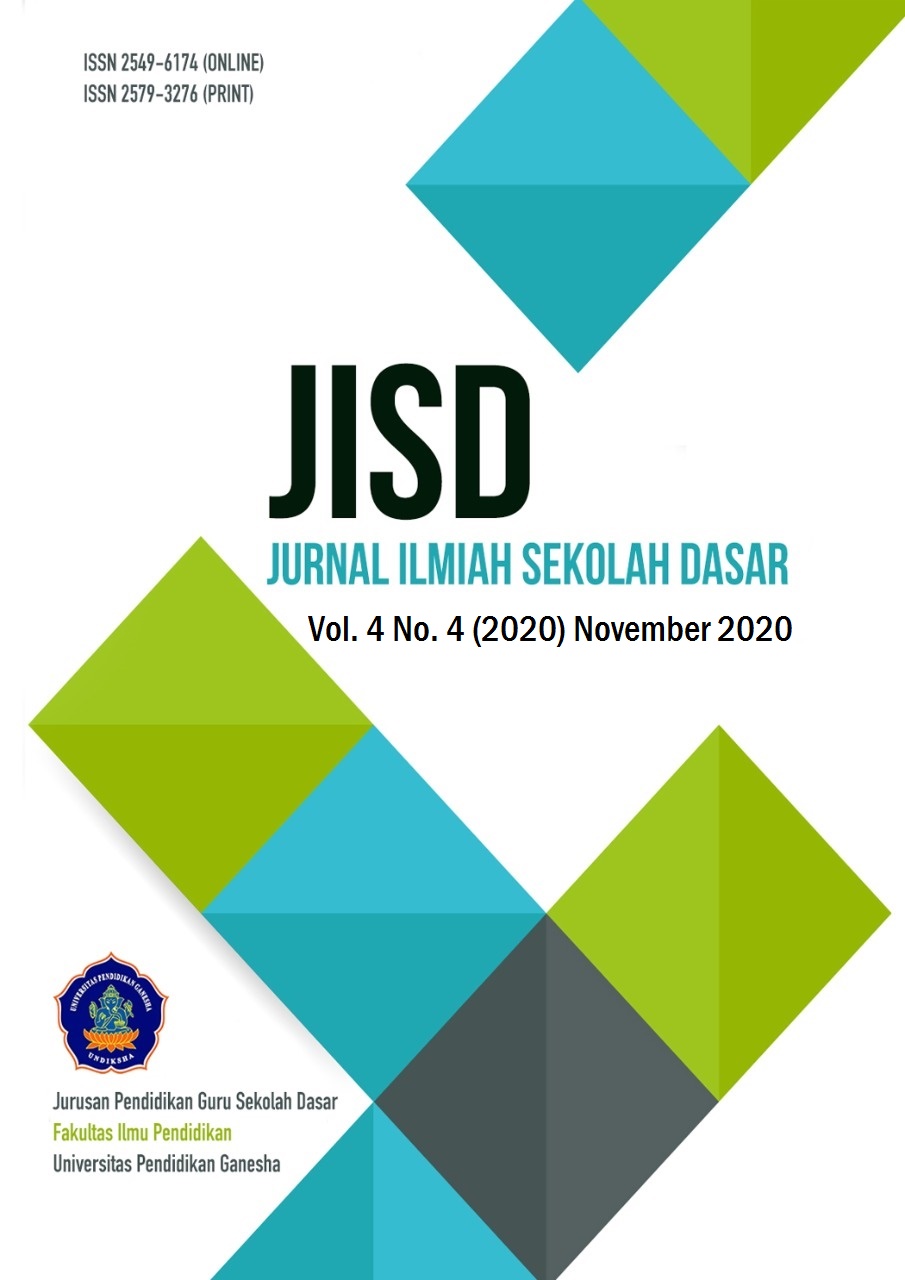The Effectiveness of Problem Based Learning toward Students’ Science Learning Outcomes
DOI:
https://doi.org/10.23887/jisd.v4i4.25667Keywords:
problem based learning, science learning outcomes, learning modelAbstract
Science learning outcomes of fourth grade students in elementary schools still tend to be low. The learning model used by teachers still dominates conventional learning. ThisThis research is a quasi-experimental (Quasi Experiment), with a Non Equivalent post-test only control group design. The population in this study were all grade IV elementary school students, and by using the random sampling method, two research samples were obtained, the experimental group and the control group class. Multiple choice tests were chosen as a method of data collection, for the analysis of the data in this study descriptive statistical analysis techniques and t-tests were used. After analyzing the data, the result of tcount (4.84) <ttable (2.01) shows that the Problem Based Learning model has a significant effect on the science learning outcomes of Grade IV students. Based on the results of research that has been done the Problem Based Learning model has a significant effect on the learning outcomes of Natural Sciences.
References
Agung, A.A. G. 2010. Pengantar Evaluasi Pendidikan. Singaraja: Jurusan Teknologi Pendidikan Fakutlas Ilmu Pendidikan Universitas Pendidikan Ganesha.
Agung, A.A. G. 2014. Metodologi Penelitian Pendidikan. Singaraja: FIP Undiksha.
Anazifa, R. D., & Djukri. (2017). Project- based learning and problem- based learning: Are they effective to improve student’s thinking skills? Jurnal Pendidikan IPA Indonesia, 6(2), 346–355. https://doi.org/10.15294/jpii.v6i2.11100
Dolmans, D. H. J. M., Loyens, S. M. M., Marcq, H., & Gijbels, D. (2016). Deep and surface learning in problem-based learning: a review of the literature. Advances in Health Sciences Education, 21(5), 1087–1112. https://doi.org/10.1007/s10459-015-9645-6
Hariata, I. N. N., Pudjawan, K., Margunayasa, I. G., & Pgsd, J. (2017). Pengaruh Model Pembelajaran Problem Based Instruction Berbantuan Media Powerpoint Terhadap Hasil Belajar Ips.
Kemampuan Berpikir, D., Pada, K., Ketut, I., Sekolah, S., Agama, T., Mpu, H. N., & Singaraja, K. (n.d.). Pengaruh Model Pembelajaran Kooperatif Tipe Think Talk Write (Ttw) Terhadap Hasil Belajar. 19–24.
Kesuma, Hendra, T. dan S. (2017). PENGARUH MODEL PROBLEM BASED LEARNING BERBANTUAN MIND MAPPING TERHADAP Universitas Pendidikan Ganesha. 1–10.
Khusna, F. (2018). The Effect of Problem Based Learning Model Nuanced Science Literacy Towards Junior High School Students ’ Natural Sciences Learning Competence in Environmental Pollution and Global Warming Learning Materials. 2, 129–134.
Malmia, W., Makatita, S. H., Lisaholit, S., Azwan, A., Magfirah, I., Tinggapi, H., & Umanailo, M. C. B. (2019). Problem-based learning as an effort to improve student learning outcomes. International Journal of Scientific and Technology Research, 8(9), 1140–1143. https://doi.org/10.5281/zenodo.3457426
Ngalimun.2016. Strategi dan Model Pembelajaran. Yogyakarta: Aswaja Pressindo.
Nasution, M. K. (2017). Penggunaan metode pembelajaran dalam peningkatan hasil belajar siswa. STUDIA DIDAKTIKA: Jurnal Ilmiah Bidang Pendidikan, 11(1), 9–16.
Nurdyansyah, & Toyiba, F. (2016). Pengaruh strategi pembelajaran aktif terhadap hasil belajar pada Madrasah Ibtidaiyah. Tekpen, 1(2), 929–930. http://eprints.umsida.ac.id/id/eprint/1610
Rafli, M. F., Syahputra, E., & Yusnadi, D. (2018). The Effect of Problem Based Learning Model on Mathematical Communication Skills and Students’ Self-Confidence in Junior High School. March 2019. https://doi.org/10.2991/aisteel-18.2018.89
Sugiono. 2010. Metode Penelitian pendidikan (Pendekatan Kuantitatif, Kualitatif, dan R&D). Bandung: Alfabeta.
Trianto. 2007. Model-model Pembelajaran Inovatif Berorientasi Konstruktivistik:Konsep Landasan Teoritis-praktis Implementasinya. Jakarta: Prestasi Pustaka.
Ulger, K. (2018). The effect of problem-based learning on the creative thinking and critical thinking disposition of students in visual arts education. Interdisciplinary Journal of Problem-Based Learning, 12(1), 3–6. https://doi.org/10.7771/1541-5015.1649
Unit, E., & Curriculum, L. (2015). Karakteristik Kurikulum 2013 Dan Kurikulum Tingkat Satuan Pendidikan (Ktsp). El-Idare: Journal of Islamic Education Management, 1(01), 15–31.
Widiana, I. W. (2016). Pengembangan Asesmen Proyek Dalam Pembelajaran Ipa Di Sekolah Dasar. JPI (Jurnal Pendidikan Indonesia), 5(2), 147. https://doi.org/10.23887/jpi-undiksha.v5i2.8154
Yuliati, Y. (2017). Literasi Sains Dalam Pembelajaran Ipa. Jurnal Cakrawala Pendas, 3(2), 21–28. https://doi.org/10.31949/jcp.v3i2.592
Downloads
Published
How to Cite
Issue
Section
License
Authors who publish with the Journal Ilmiah Sekolah Dasar agree to the following terms:
- Authors retain copyright and grant the journal the right of first publication with the work simultaneously licensed under a Creative Commons Attribution License (CC BY-SA 4.0) that allows others to share the work with an acknowledgment of the work's authorship and initial publication in this journal.
- Authors are able to enter into separate, additional contractual arrangements for the non-exclusive distribution of the journal's published version of the work (e.g., post it to an institutional repository or publish it in a book), with an acknowledgment of its initial publication in this journal.
- Authors are permitted and encouraged to post their work online (e.g., in institutional repositories or on their website) prior to and during the submission process, as it can lead to productive exchanges, as well as earlier and greater citation of published work. (See The Effect of Open Access)










